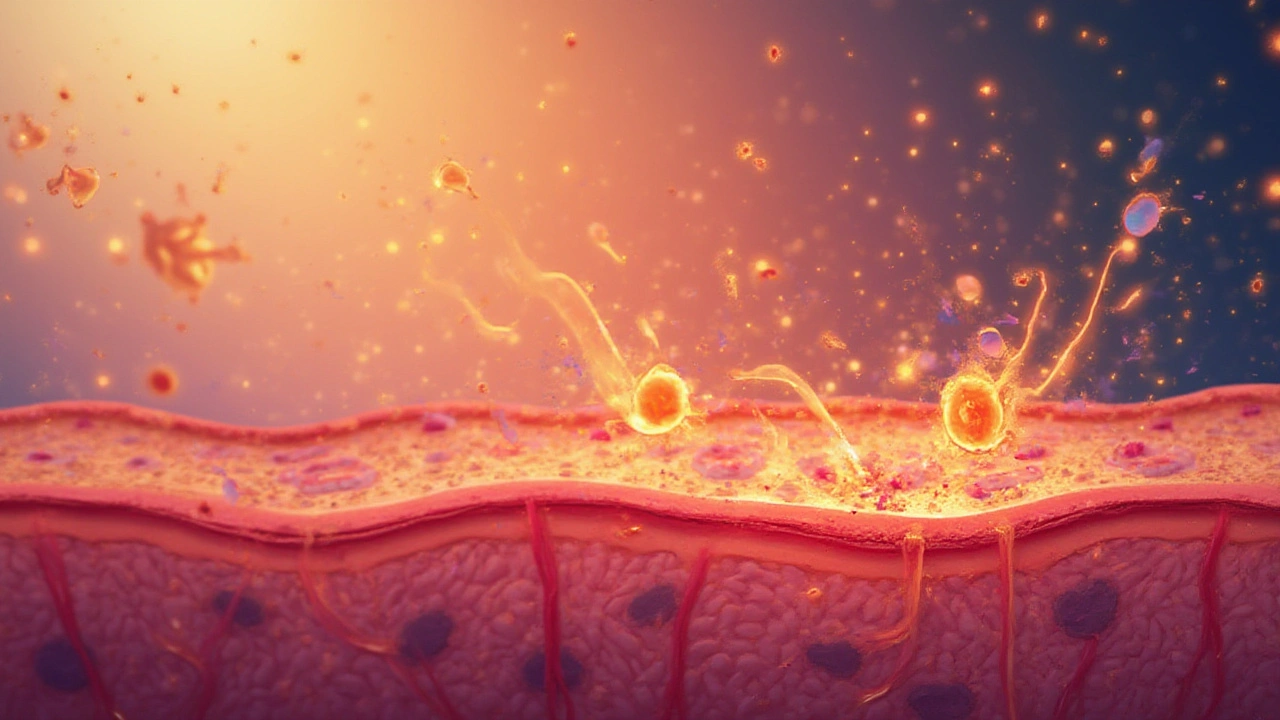Your skin suddenly feels like it’s on fire after eating a peanut butter sandwich. Or maybe your eyes sting and your throat burns after a neighborhood walk when the pollen count is high. That annoying, weird, almost painful burning isn’t random—your own body is trying to tell you something. Allergies are sneaky, and they don’t always look the way you expect.
What Causes a Burning Sensation During Allergic Reactions?
When people think of allergies, sneezing and rashes usually come to mind. But a burning sensation? That’s a less talked about clue, and it’s actually pretty common. So, what’s going on with the body when you feel that burn? Let’s break down the science in a way that gives you real answers, not just textbook explanations.
Allergies happen when your immune system gets a little too excited—overreacting to things like food, pollen, pet dander, or cosmetic ingredients. Instead of chilling out, your immune cells see these everyday substances as threats. When this happens, your body releases histamine and other chemicals. These chemicals are like little alarm bells. In some people, the alarm bells go quiet quickly. For others, it turns into a four-alarm fire inside the skin or mucous membranes. That “burning” feeling is actually a combination of inflammation, increased blood flow, and nerve stimulation.
Let’s take food allergies for example. If you’re allergic to nuts, you might feel your lips or throat tingle and burn almost right away after eating. Studies published in Allergy (a major allergy journal) show that 30% of food allergy sufferers report burning as their first symptom before swelling or rash. That burning is your nerves lighting up because your immune system is sending inflammatory warriors, like histamine, right to the scene.
Some allergens go straight for the eyes—think seasonal pollen. Burning, itchy, watery eyes during allergy season are famous. But fewer people realize why: Your eye’s blood vessels swell with histamine-driven inflammation, and the nerves around them get irritated. The American College of Allergy, Asthma & Immunology notes that allergic conjunctivitis (which is just a fancy name for allergic eye reactions) can feel distinctly burning, not just itchy or red.
Mouth and throat burning, especially without visible swelling, is another classic “hidden” allergy symptom. A well-known study from the Karolinska Institute found that over 40% of people with pollen allergies get burning mouth syndrome when they eat certain fruits or vegetables. This is called “oral allergy syndrome” and usually pops up in people allergic to birch pollen when they eat apples or carrots—because the body mistakes those foods for the pollen it hates.
Even your skin isn’t safe from the burning effect. Ever put on a lotion or mask and instantly felt burning and redness? You’re probably having a mild hypersensitivity reaction. Dermatologists say this happens because some skin barrier proteins break down, letting histamines smack your nerve endings. That’s your signal to wash it off fast!
Here’s a practical table with common allergens and their typical burning symptom sites. Compare your own experiences and you might spot a helpful pattern:
| Common Allergen | Usual Burning Sensation Location | Accompanying Symptoms |
|---|---|---|
| Peanuts/tree nuts | Lips, mouth, throat | Swelling, tingling, redness |
| Pollen | Eyes, nose, mouth | Itching, watery eyes, congestion |
| Cosmetics/skincare | Face, hands | Redness, swelling, peeling |
| Animal dander | Eyes, skin, throat | Itching, coughing, runny nose |
| Latex | Hands, exposed skin | Itching, rash, blisters |
Bottom line, when you notice a burning sensation just after exposure to a food, product, or environmental trigger, your allergy symptoms aren’t just in your head. Your immune system is calling the shots and telling you to pay attention—even if you don’t break out into hives or start wheezing.

How to Tell If Burning Means Allergy or Something Else?
Bodies are complicated, and burning can show up for a bunch of reasons. Sure, allergies are a big player, but there are other culprits like infections, nerve issues, acid reflux, or even stress. So how can you tell if your burning trouble is really allergy-based?
First, timing is everything. If burning kicks in right after eating, touching, or inhaling something new or familiar (like cleaning products or pet fur), that’s a red flag. Allergic reactions tend to show up within minutes to an hour. If days go by before you feel anything, it’s less likely to be an allergy and more likely an infection or other irritation.
Location gives more clues. Allergic burning is usually pretty localized. It’ll hit the mouth after a food you’re sensitive to, or the skin where a cosmetic touched. Compare that to something systemic, like a fever or deep infection, which might cause widespread pain or burning all over your body.
Pay attention to what else comes with the burning. Allergies often travel with company: itching, redness, swelling, maybe hives or blisters. You might see/feel watery or inflamed eyes or a runny nose if the trigger was airborne. If you don’t get any other symptoms at all (like your only symptom is burning, no itching, no weird swelling), check in with a doctor—just in case it’s not allergic at all but something more serious.
Certain people are just more prone to burning sensations from allergies. If you’ve got eczema or other skin sensitivities, studies from the American Academy of Dermatology say you’re more likely to report burning with skin allergies. Same goes for people with hay fever and asthma—your immune system loves to overreact.
Talk to people you know who have food allergies or sensitive skin—chances are, they’ll tell you burning is one of their most frustrating symptoms. That burning can last anywhere from a few minutes to hours, depending on how much you were exposed to and whether you immediately washed it off or popped an antihistamine. The burning can sometimes give way to itching or even numbness. It’s a communication line your body keeps open long enough for you to notice and get rid of the trigger.
Doctors use patch testing and skin prick tests for pinpointing topical allergies, and oral food challenges for foods. If you’ve had burning from skincare, perfumes, or cleaning products, make a note of ingredients and see if there’s a pattern (for example, lots of people react to fragrance mixes or preservatives such as parabens).
If your burning sensation comes with trouble breathing, swelling of the tongue or throat, or confusion, don’t play around—call emergency services right away. This could be anaphylaxis, which is a severe and sometimes fatal allergic reaction. That sounds scary, because it is! Don’t tough it out hoping it’ll go away on its own. But if it’s just mild or moderate burning, you can usually manage it on your own, as long as you avoid repeat exposure and watch for worsening signs.
- If you’re dealing with mild burning, rinse the area thoroughly with cool water. This is the easiest way to remove allergens from skin or eyes.
- Apply a hypoallergenic moisturizer or barrier cream to calm burning skin. Avoid creams with added fragrances or acids that could make the burning worse.
- Take an over-the-counter antihistamine (like cetirizine or loratadine) if you frequently get burning from allergies. This can lower the body’s histamine response.
- Keep an "allergy diary." Jot down what you ate, used, or touched when symptoms appear. Patterns make triggers easier to spot, and you’ll have better info for your doctor.
- When in doubt, take a break. Sometimes burning is a signal to give your skin, body, or gut a reset from whatever’s causing grief. Don’t push through.
For anyone suspecting allergy as the source of burning, allergists offer patch testing for contact allergies, prick skin tests for environmental triggers, and supervised food challenges for dietary allergies. Detailed, honest symptom reporting is your secret weapon—don’t underestimate how much detail helps. Write it all down. That idle burning you ignored after eating a kiwi might save you from a scary reaction down the line.

Prevention, Management, and Everyday Life With Allergy-Induced Burning Sensations
Living with burning sensations from allergies isn’t just about popping a pill and moving on. It’s about learning what really sets you off, mastering avoidance, and handling symptoms when they pop up out of nowhere. Some people spend years chasing down triggers. Others get lucky and connect the dots fast. Knowing what to do, and just as importantly, what not to do, makes all the difference.
Here are some tips that come from real allergy sufferers (and yes, I’ve polled my allergy-prone friends for their best coping hacks):
- Read labels obsessively—not just food, but also makeup, shampoos, cleaners, and anything that touches skin. “Fragrance-free” doesn’t always mean totally free of allergens, so look for “hypoallergenic” and “no added fragrance” claims, but always read the fine print.
- Wear gloves when using new skincare or cleaners. Test a small patch first before slathering it on your face, arms, or legs. You’d be surprised how many allergic burns come from a new lotion or face wash.
- Invest in a high-quality air purifier for home, especially in bedroom and living areas, to filter out pollen and dander. The Asthma and Allergy Foundation of America reports air purifiers can cut indoor allergen exposure by up to 40%.
- If you have oral allergy syndrome (getting burning after eating certain raw fruits or veggies), try peeling or cooking those foods. Heat usually breaks down the allergy-triggering proteins.
- Keep a stash of oral antihistamines and soothing creams (like 1% hydrocortisone), but use them wisely—not every skin irritation needs steroid cream, and overuse can actually make skin thinner or more sensitive.
- Be honest when eating out or trying new foods. Don’t take risks even if everyone else seems fine—your body is unique, and your burning reaction is not an overreaction.
- Prioritize self-care: change pillowcases often (traps pollen and dander), wash hands and face after coming indoors, and don’t suffer in silence if symptoms keep coming back or get worse.
- Talk to your doctor about allergy testing, since sometimes what you think is an allergy might actually be intolerance or a different problem altogether.
Fun fact: there’s a genetic link to how your skin or nerves respond to allergens. Certain people are naturally more “sensitive” on a cell level, and researchers at Johns Hopkins say that between 10-15% of people have what’s called “sensitive skin syndrome.” If you’re constantly feeling burning, redness, or stinging from even gentle products, this could be why. Don’t beat yourself up; you’re literally wired this way.
If you’re into tracking trends, data shows the global rate of allergies is rising—especially in urban areas where pollution might make symptoms like burning even worse. In the U.S., the CDC estimates 1 in 5 people has some type of allergy, with food and pollen allergies topping the chart. Around 25% of those will report burning as an early or unusual symptom.
No story about burning and allergies is complete without talking about prevention in daily life. Many families swap carpets for hard floors, use “green” cleaning products, and keep pets out of bedrooms to cut exposure. If you can tolerate it, regular saline nasal rinses are great for keeping burning nasal passages under control.
Workplaces can be tricky—you might have to advocate for fragrance-free zones, air purifiers, or changes in cleaning routines. Don’t be shy; you need a comfortable environment as much as anyone. The burning sensation isn’t “just in your head,” and you have every right to protect your health and well-being.
The best thing you can do for yourself is pay attention. If burning starts after a meal, product, or season change, jot it down, take action, and talk to a health provider if it keeps happening. Your body has its own way of waving the red flag. Responding to it means you’ll feel better, waste less time on guesswork, and maybe help someone else spot allergy symptoms before they get serious. Trust what your skin, eyes, or mouth are telling you—they’re the best messengers you’ve got.

jobin joshua
July 23, 2025 AT 15:09Sachin Agnihotri
July 25, 2025 AT 08:00Diana Askew
July 26, 2025 AT 11:14King Property
July 27, 2025 AT 09:43Yash Hemrajani
July 28, 2025 AT 11:57Pawittar Singh
July 28, 2025 AT 15:46Josh Evans
July 28, 2025 AT 20:52Allison Reed
July 29, 2025 AT 10:11Jacob Keil
July 30, 2025 AT 19:46Rosy Wilkens
July 31, 2025 AT 20:55Andrea Jones
August 2, 2025 AT 05:17Justina Maynard
August 3, 2025 AT 21:28Evelyn Salazar Garcia
August 4, 2025 AT 01:46Clay Johnson
August 4, 2025 AT 22:06King Property
August 5, 2025 AT 16:39